- Home
- Amelia Grey
Wedding Night With the Earl Page 2
Wedding Night With the Earl Read online
Page 2
“I don’t know anything about teaching a child how to ride a horse or hold a bow, even if I wanted to,” Adam muttered impatiently. “Which I don’t.” The driver placed a trunk at Adam’s feet. He frowned, looked up at Hopscotch, and asked, “What’s this?”
“I’m really not sure,” the Prince’s man said, staring at the trunk. “But I would suspect it’s some of whatever is left of Master Dixon’s possessions. I think there are more things at the orphanage, but I’ll leave it to you to look into that for him.”
Mr. Hopscotch reached for the handle to the carriage door. Quick as lightning, Adam slammed his open hand against it, holding it shut. Hopscotch and the boy flinched from the loud crack.
Adam’s gaze zeroed in on Hopscotch, and he leaned his face dangerously close to the older man’s.
“I said, you aren’t leaving him with me.” Adam’s voice was low and calm, but there could be no doubt that he meant what he said.
“In this you have no choice, my lord.” Mr. Hopscotch calmly pointed to the top of the carriage.
Adam glanced up and saw the guard had his musket trained on Adam’s chest. He didn’t think for a minute the sentinel would shoot him, but he would keep Adam from harming Hopscotch.
“Unfortunately, he’s on the Prince’s orders, not mine. I can’t tell him what to do. As far as the Prince is concerned, you are the Earl of Greyhawke and this child is your heir and your responsibility.”
Responsible? For this bony snip of a lad?
Adam had barely been able to take care of himself the past two years. He no longer drank all night and all day, as he had when he’d first arrived in Yorkshire, but he certainly wasn’t capable of taking on the care of a young child.
“What you do with him from here on out will be your choice. If you don’t want to care for him,” Mr. Hopscotch continued in an irritated voice, “hire him out as a servant or take him to London and put him back in the orphanage. Quite frankly, Lord Greyhawke, I wouldn’t have the stomach to do something like that to him.”
A servant or orphanage? What kind of man did Hopscotch think he was?
Adam turned to Dixon. His big eyes were wide and staring straight ahead. He looked so stiff and brittle at the moment, Adam feared he’d break if anyone touched him.
“An orphanage?” Adam asked from between clenched teeth. “Where the hell…” Mr. Hopscotch’s brows lifted. Adam stopped and swore silently as he cleared his throat. “Where’s his mother? He needs to be with her until he’s old enough to be sent to school.”
“She’s no longer with us,” the Prince’s man answered almost under his breath.
“You mean she’s—”
“Yes,” said Mr. Hopscotch, cutting off Adam’s words quickly. “From what we’ve been able to discover, she was the only family he had, except for you, of course.”
Adam looked at the young lad standing so stoically. There was no doubt the boy knew what they were talking about. His eyes held a glistening gleam, though he never moved or said a word. For the first time in over two years, Adam felt his heart soften. He didn’t want it to, but he felt the boy’s pain of loss and knew that someone so young shouldn’t have to feel that overpowering sense of helplessness.
Adam wanted to reject the pull of compassion that gripped him, worming its way into his soul. “I don’t know what to do with him,” he grumbled. “Doesn’t he have a nurse or governess? Look at him. He can’t be more than three or four years old.”
“I’m five,” Dixon said defiantly in his first show of any kind of emotion as he looked up at Adam with glaring brown eyes. “I don’t need a nurse. I can take care of myself.” He then jerkily folded his arms across his chest and set his lips in a thin, firm line.
“Good,” Adam responded. “If you stay here with me, you’ll probably have to.”
“We hope it won’t come to that, my lord,” Mr. Hopscotch said, and then stopped and sighed heavily. “The Prince is happy to assist you in any way you might need.”
“Me mum said I was small for my age,” the little boy said, obviously not ready to forgive Adam for thinking him younger.
“That you are.”
“I’ll grow,” Dixon insisted. “I’ll be taller than you one day.”
“Let’s hope so,” Adam said more to himself than the lad.
“We found out that Master Dixon was living in an orphanage. Apparently, a neighbor, who unfortunately didn’t know what to do, placed him there. He certainly didn’t have the means to bring Master Dixon up in the proper way an heir to a title should be educated, protected, and nourished,” Mr. Hopscotch said. “For more than two months now, my lord, the extensive Greyhawke estates have been left in the hands of solicitors, managers, and all manner of overseers. You need to come to London, talk to your solicitors, and start seeing to all your properties. If you don’t want the lands and businesses kept up properly and in good stead for the benefit of yourself, at least do your duty, as a man of honor, for your staff who takes care of your homes, the tenants who work your lands, and for Master Dixon until the time he comes of age.”
Adam had never really thought about the responsibility that came with the title he’d never expected to hold. Tenants, lands, and businesses? A five-year-old homeless heir?
He vacillated again. He didn’t want to take care of the lad, but Hopscotch knew he’d never send Dixon to an orphanage. Adam was a man of honor. That was about the only thing he hadn’t denounced when he’d moved to the coast.
Adam had done a lot of things in his thirty years of life. Some good. Some bad. But he’d never run from a fight or from an obligation, and he couldn’t now.
His gaze swept over to the defiant little lad again, and his mind started swirling with thoughts. As the earl, it was his duty to beget an heir. Yet he’d vowed never to marry again and put another woman through the hell Annie went through trying to have his babe. And now he didn’t have to. He had an heir. Through no fault of either of them, Dixon was suddenly Adam’s responsibility. So was this fate’s way of trying to make up that loss to him and grant him an heir?
Adam grunted a short, humorless laugh. Obviously fate was not through with him yet.
He might not want to be Dixon’s guardian, but how could he leave the lad to suffer in an orphanage or worse? He couldn’t. Dixon needed to be nurtured as if he were Adam’s own child.
And just that quickly, Adam knew he would give up his solitary life and satisfy tradition. He would move back to London as the Earl of Greyhawke and be responsible for all it encompassed. Maybe at last, through this deed of caring for Dixon, he could find some measure of happiness, if not redemption, for what he’d done to his wife.
Adam took in a large breath, knowing what he was facing. He looked down at the boy and said grudgingly, “Come with me. It’s best you make friends with Pharaoh.”
Chapter 3
I have set my life upon a cast,
And I will stand the hazard of the die.
—Richard III, act 5, scene 4
Adam’s first full day in London had been a challenge, and thankfully it was coming to an end.
Between solicitors clamoring for his undivided attention, tailors measuring him for new clothing, and a surprised bevy of servants—who, he felt certain, weren’t sure they believed him to be the new earl—scurrying about, Adam’s head was pounding. Dixon had managed to stay out of the fray by playing in his new room with the wooden soldiers Adam had bought him before leaving Yorkshire.
Pharaoh hadn’t been as accommodating. Adam had to keep the dog close to his side. The new surroundings and activity of so many strangers in the house had him either barking or pacing for most of the day. Adam kept thinking he’d have time to take the restless Pyrenees for a walk, but that hadn’t happened.
One good thing about coming back to London as the new Earl of Greyhawke was that Adam didn’t have to go back to the house he’d shared with Annie. He knew he had to do something with the property one day, but not right now. Learning that as Lord
Greyhawke he had a well-staffed house in Mayfair waiting for his arrival made his decision to return to London a bit easier to shoulder.
When he’d arrived yesterday, Clark, the butler, and Mrs. Goodstone, the housekeeper, had stared at him as if he’d come from a strange part of the world. He guessed that to some extent, they were right in their assessment of him. His best commoners’ clothing didn’t come close to the quality of a poor nobleman’s frock, let alone the finery of a prosperous earl. Adam had pulled his hair back in a queue like a proper gentleman, but by the expressions on the servants’ faces, it did little to alleviate their fears that the earldom had been commandeered by a common mischief maker. Which was the main reason he’d sent for a tailor right away.
He could have told them that he was more shocked than they were about the turn of events. Bearing the title of earl wasn’t the way he’d envisioned living out his life. But now that he had accepted the role, he would be a good and proper custodian of the earldom and guardian for Dixon.
Now the solicitors and tailors were gone and the day was late. Lamps and fires had been lit, and the house was quiet once again. But there was one more thing Adam wanted to do before he poured himself a much needed glass of port. He had to take Pharaoh for a long walk, and it would probably be good for Dixon to get out of the house for a while, too.
Adam closed the ledger he’d been studying and placed the quill in its holder. He was about to push his chair away from his desk when Pharaoh started barking from the front of the house.
At the cottage, Adam would have ignored such an outburst from his dog because he often barked at squirrels, rabbits, and other small animals that roamed the land. But because Mrs. Goodstone and the other maids were still wary of such a large dog in the house, Adam rose from his desk to investigate.
Before he made it across the room, he heard familiar male voices and laughter join the barking. His steps lightened. Rounding the doorway, he saw Bray and Harrison standing in the vestibule. Pharaoh jumped on first one and then the other as they patted his head and shoulders and rubbed his back. The quiet butler stood to the side, looking mystified by the merriment taking place.
Adam smiled at the sight of them. Shortly after Mr. Hopscotch’s visit, Adam had penned short messages to both his friends, saying he would be returning to London but his arrival date was uncertain. He should have known they would be keeping watch for him.
“How did you two blackguards know I was in Town?” Adam asked, walking down the corridor toward them. “I only arrived late yesterday afternoon.”
“Don’t you remember, my friend?” Bray said as Pharaoh continued to jump up on his chest, demanding attention. “There are no secrets in London.”
“And keep in mind there are no hiding places, either,” Harrison added as Adam shook hands with him and clapped Bray on the back, greeting them both warmly.
It was always good to see his childhood friends. Adam had never told them, but he’d appreciated their visits to Yorkshire to see him the past two years. He knew they feared they’d be intrusive, but they hadn’t been. They’d been welcomed. He didn’t think he’d ever let them know that, and he should have.
“Pharaoh, down,” Adam said as the tall, strapping men tried to shrug out of their coats and gloves and give attention to Pharaoh, too. The dog woofed and jumped on Adam, wagging his long, sweeping tail excitedly. “Sit, Pharaoh, sit,” he said, and rubbed the Pyrenees’s head when he quickly obeyed.
“It’s been too long, Adam,” Harrison said. “It’s about time you decided to come back.”
“And I’m damn glad you did,” Bray added, clapping him on the back again. “I wasn’t looking forward to that long, cold ride up to the north country this spring.”
“Now you don’t have to,” Adam answered. “Come into the drawing room where there’s a fire. We’ll have a drink.”
The coats were handed off to Clark, and the three men and Pharaoh walked into the drawing room. Harrison and Bray settled into the comfortable wingback chairs that faced a settee. Adam strolled over to the side table to pour three glasses of port. He heard his friends talking in low tones and looked up. Bray was leaning toward Harrison and seemed intent on whatever he was saying.
“What are you two whispering about?” Adam asked, replacing the stopper on the decanter.
“Nothing,” Bray said quickly, and sat back in his chair.
“It didn’t sound like nothing.” Adam picked up the three glasses between his two hands and started toward them. “I’d say that one of you is looking to pick a fight with me and that the other is wisely trying to talk him out of it.”
Harrison chuckled and took the drink Adam offered. “We’ve certainly done a lot of that in our lives, but not today. Bray was just saying that now you’re in London we must get you down to the Heirs’ Club so you can officially apply for membership.”
“Yes,” Bray agreed, and took his glass. “But Harrison thought it might be a little too soon for you to do that.” Bray looked at Harrison. “He knows I think the sooner the better.”
“Then once again, I bow to you being the duke and knowing more about this than I do,” Harrison said, and lifted his glass in a mock salute to Bray. “Let’s just go ahead and do it right now.”
Adam had no reason to doubt what they were saying, but the two men seemed oddly uncomfortable with each other. “No. Wait a minute,” he said, lowering his frame into the blue velvet settee. “While it might be good for you right now, it’s not good for me. It’s been a hell of a day. Not only that, as you can see I don’t have proper clothing yet. I would like to take my time and settle into London quietly, if you don’t mind.”
Harrison threw another glance in Bray’s direction. “He needs more time. We’ll take it slowly.”
“Good,” Adam said. “I want to be able to walk through the door of that club and order a drink without having Bray by my side, but it won’t be today or tomorrow.”
“Why don’t we make the Heirs’ Club your first outing in London?” Harrison asked. “We’ll meet there whenever you—”
Harrison stopped, and Adam looked behind him to see what had caught his friend’s attention. Dixon stood quietly in the doorway, twisting his hands together and looking at them curiously. Like Adam, he had been fitted for new clothing, but today he was still dressed as a commoner.
“Perhaps there’s something you need to tell us first,” Harrison said, raising his brows in surprise.
“I might as well.” Adam motioned for Dixon to come into the room. When the boy stood beside Adam, Adam turned to his friends and said, “Your Grace, my lord, may I present Master Dixon Greyhawke. Dixon, the Duke of Drakestone and the Earl of Thornwick. My oldest friends.”
The lad bowed low, rose, looked up at them, and said, “Pleased to meet you, Your Grace, my lord.”
Harrison and Bray put down their glasses, stood up, and greeted Dixon, who promptly said to them, “I’m going to be as tall as you are one day. My mum said I would be.”
“I suppose she was right,” Bray agreed.
“How old are you?” Harrison asked.
“Five,” Dixon said, displaying the fingers on one small hand for them. “I’ll be six before year’s end.”
Adam knew his friends were curious about Dixon, but Adam couldn’t talk freely in front of the lad. He excused himself and went to find Clark. He asked the butler to have a footman go with Dixon and Pharaoh for a walk in the park. Adam then returned to the drawing room, made himself comfortable on the settee again, and picked up his glass of port.
“So tell us about the boy,” Bray said.
“He arrived at my door little more than a month ago with a man by the name of Mr. Alfred Hopscotch.”
Bray and Harrison looked at each other, and Adam asked, “You know him?”
“The Prince’s emissary who takes his job very seriously,” Harrison said, then took a sip of his drink.
“We’ve both had encounters with the man for different reasons,” Bray added.
“We should have known he would eventually get around to seeing you about something, too.”
“He’s a difficult man to say no to.”
“We know,” Bray and Harrison said at the same time.
“So tell us who Dixon is and why he is here with you in London,” Bray said.
“I’ll make this short. He’s my cousin and next in line for the title, and thereby my heir.”
Bray and Harrison exchanged uncomfortable glances again.
“Maybe you should settle back with your drink and tell us the long version of the story,” Harrison suggested.
“There’s not that much to tell. I had never met Dixon. I can’t say I even knew about him until Hopscotch brought him to my house.”
Adam briefly told them about his long conversation with Mr. Hopscotch and that because of Dixon, Adam had accepted his duties as the Earl of Greyhawke so that he could one day hand over a wealthy, thriving legacy to Dixon. Adam ended by saying, “The easiest explanation is that, once again, fate gave me no choice about my life.”
“It seldom does,” Harrison said solemnly.
Harrison would know something of what Adam was feeling. Harrison’s brother and family had died from the ravages of a fever just over a year ago, unexpectedly making Harrison the new Earl of Thornwick.
“So when you say Dixon is your heir, you mean that he is until you marry and have a son.”
Adam held up his hand and shook his head for good measure. “No, I mean my heir to take over the title. There will be no more marriages, no more babes, for me. I will not go through that hell again.”
“Surely you don’t mean—”
“I do,” Adam cut in. “Dixon is my heir.”
Bray and Harrison shifted in their chairs. He supposed he could understand their unease. They were both happily wed. “Now when will I get to meet the duchess and the countess?” Adam asked.

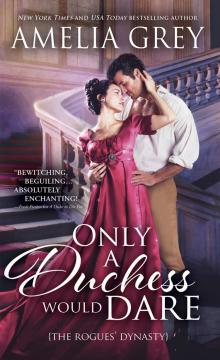 Only a Duchess Would Dare
Only a Duchess Would Dare The Earl Next Door
The Earl Next Door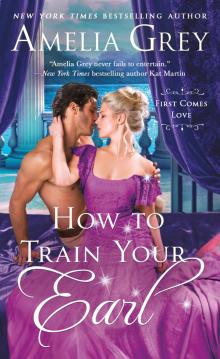 How to Train Your Earl
How to Train Your Earl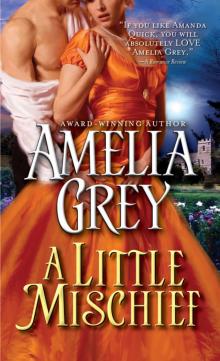 A Little Mischief
A Little Mischief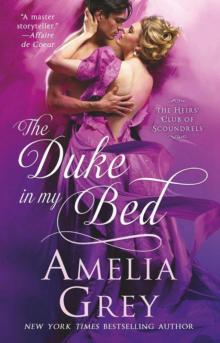 The Duke in My Bed
The Duke in My Bed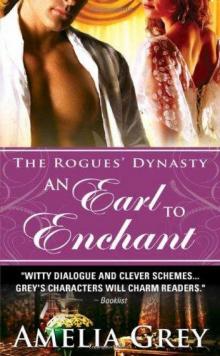 An Earl to Enchant: The Rogues' Dynasty
An Earl to Enchant: The Rogues' Dynasty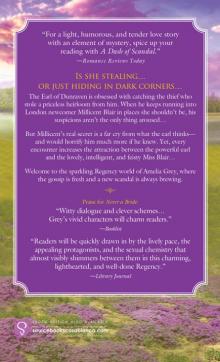 A Dash of Scandal
A Dash of Scandal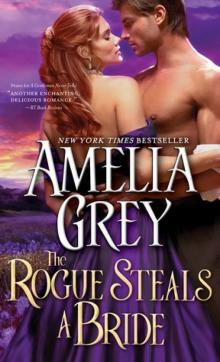 The Rogue Steals a Bride
The Rogue Steals a Bride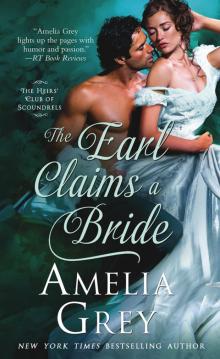 The Earl Claims a Bride
The Earl Claims a Bride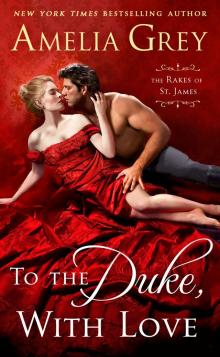 To the Duke, With Love
To the Duke, With Love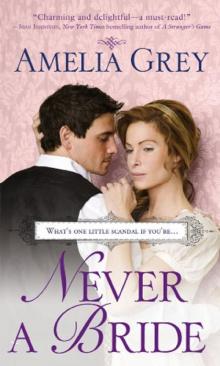 Never a Bride
Never a Bride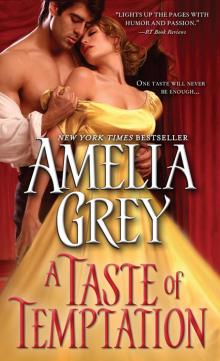 A Taste of Temptation
A Taste of Temptation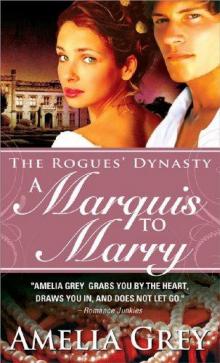 A Marquis to Marry
A Marquis to Marry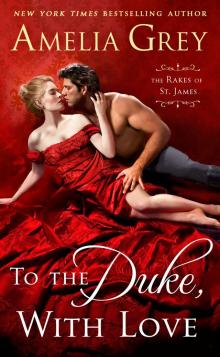 To the Duke, With Love--The Rakes of St. James
To the Duke, With Love--The Rakes of St. James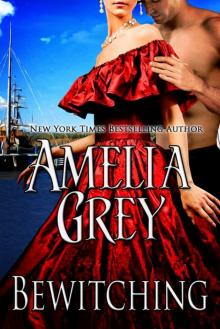 Bewitching
Bewitching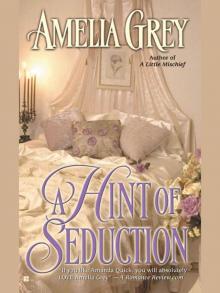 A Hint of Seduction
A Hint of Seduction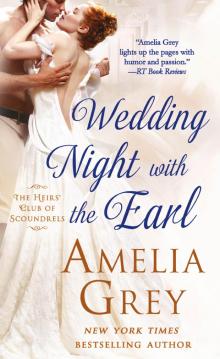 Wedding Night With the Earl
Wedding Night With the Earl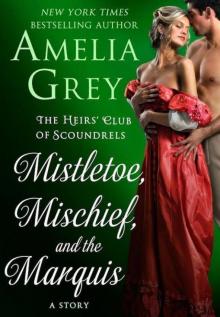 Mistletoe, Mischief, and the Marquis (The Heirs' Club)
Mistletoe, Mischief, and the Marquis (The Heirs' Club)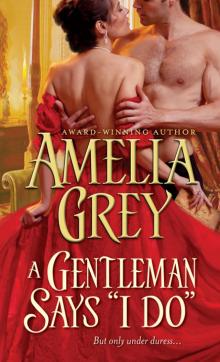 A Gentleman Says I Do
A Gentleman Says I Do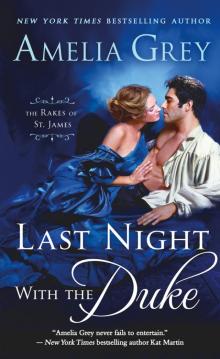 Last Night with the Duke
Last Night with the Duke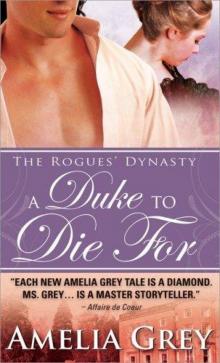 A Duke to Die for: The Rogues' Dynasty
A Duke to Die for: The Rogues' Dynasty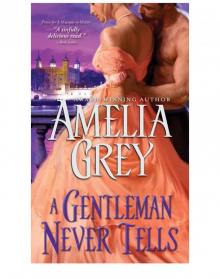 A Gentleman Never Tells
A Gentleman Never Tells The Duke and Miss Christmas
The Duke and Miss Christmas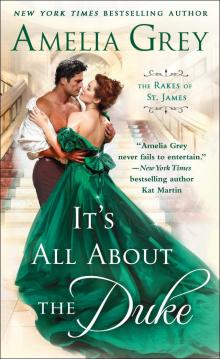 It's All About the Duke--The Rakes of St. James
It's All About the Duke--The Rakes of St. James